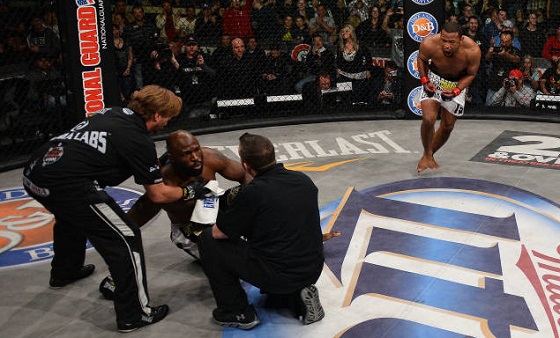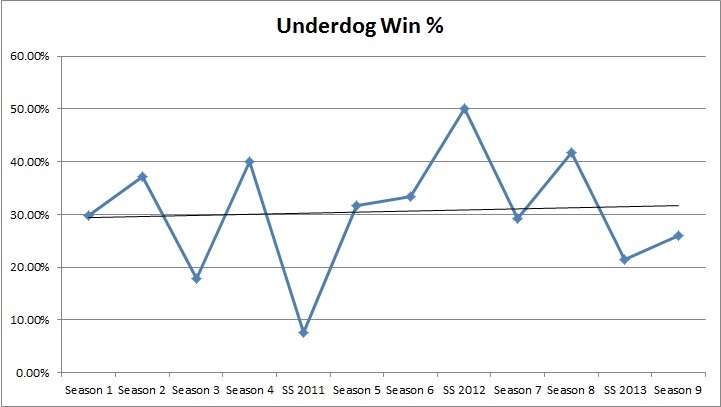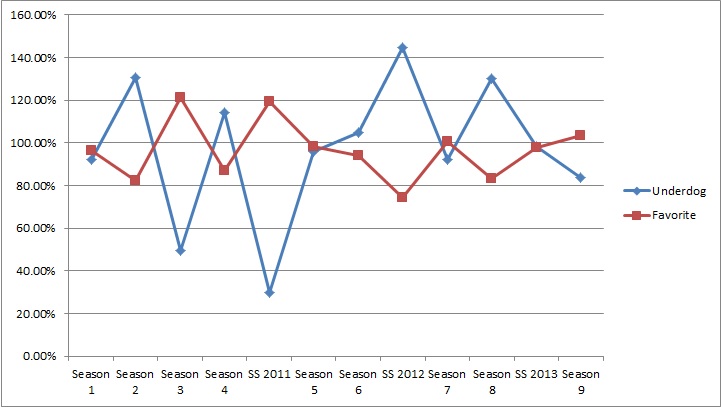Long-Term Betting Trends – Bellator: The Land of Upsets?
 For Bellator, 2013 was an unpredictable year. From becoming a Spike TV entity, to the attempt at cross-promotion with the TNA professional wrestling organization, to Eddie Alvarez’ contract saga, there were many unknowns facing the world’s second-largest MMA promotion last year. However, nowhere did that unpredictability play out more than in the actual fights. Bellator was home to some massive upsets in 2013, in fact two of the shocking results from the Bellator cage rank up with the biggest MMA upsets of all-time from a numbers perspective. Emanuel Newton and LaRue Burley both won fights as more than 9-to-1 underdogs inside the circular cage, and they weren’t alone in tipping over the proverbial apple cart. Daniel Straus was a +380 underdog when he took the featherweight title away from Pat Curran at Bellator 106. On that very same card, both the aforementioned Alvarez and Newton won fights as more than 2-to-1 dogs as well. There was also Doug Marshall, who won as an underdog three times to capture the season 8 middleweight tournament. With all of the surprising results, Bellator has gained a bit of a reputation amongst bettors as an unpredictable organization to bet on, or a place where you just need to bet on underdogs to come out ahead, but is that really warranted? Let’s take a look at the numbers to find out. Recently, I examined the upset rates in the UFC when fights took place on different platforms (PPV, Fox, Fox Sports 1, etc.), and established some baseline numbers for the frequency of upsets using data from the past two years. In the UFC over that period of time upsets occurred in 31.88% of fights. That number was derived from 709 fights. Because Bellator doesn’t put on as many events as the UFC, I went back a little bit further to find the largest sample size of data possible. Since the organization began promoting fights back in 2009, there have been 477 bouts that have had odds published (as per Several Bookmakers). Of those 477, five bouts closed as a pick ‘em, two ended as no contests, and one was a draw, leaving us with 469 viable bouts to use. In those fights, underdogs have come away with the victory 146 times. That equates to a winning rate of 31.13%, a smaller number than even the supposedly consistent betting in the UFC. Even if we just looked at the 2013-13 bouts (like in the UFC examination), underdogs won 79 times in 245 fights, for a slightly higher 32.24% rate of victories.
For Bellator, 2013 was an unpredictable year. From becoming a Spike TV entity, to the attempt at cross-promotion with the TNA professional wrestling organization, to Eddie Alvarez’ contract saga, there were many unknowns facing the world’s second-largest MMA promotion last year. However, nowhere did that unpredictability play out more than in the actual fights. Bellator was home to some massive upsets in 2013, in fact two of the shocking results from the Bellator cage rank up with the biggest MMA upsets of all-time from a numbers perspective. Emanuel Newton and LaRue Burley both won fights as more than 9-to-1 underdogs inside the circular cage, and they weren’t alone in tipping over the proverbial apple cart. Daniel Straus was a +380 underdog when he took the featherweight title away from Pat Curran at Bellator 106. On that very same card, both the aforementioned Alvarez and Newton won fights as more than 2-to-1 dogs as well. There was also Doug Marshall, who won as an underdog three times to capture the season 8 middleweight tournament. With all of the surprising results, Bellator has gained a bit of a reputation amongst bettors as an unpredictable organization to bet on, or a place where you just need to bet on underdogs to come out ahead, but is that really warranted? Let’s take a look at the numbers to find out. Recently, I examined the upset rates in the UFC when fights took place on different platforms (PPV, Fox, Fox Sports 1, etc.), and established some baseline numbers for the frequency of upsets using data from the past two years. In the UFC over that period of time upsets occurred in 31.88% of fights. That number was derived from 709 fights. Because Bellator doesn’t put on as many events as the UFC, I went back a little bit further to find the largest sample size of data possible. Since the organization began promoting fights back in 2009, there have been 477 bouts that have had odds published (as per Several Bookmakers). Of those 477, five bouts closed as a pick ‘em, two ended as no contests, and one was a draw, leaving us with 469 viable bouts to use. In those fights, underdogs have come away with the victory 146 times. That equates to a winning rate of 31.13%, a smaller number than even the supposedly consistent betting in the UFC. Even if we just looked at the 2013-13 bouts (like in the UFC examination), underdogs won 79 times in 245 fights, for a slightly higher 32.24% rate of victories.
Even looking at the chart above, it shows that while there has been fluctuation from season to season in terms of the success of underdogs in Bellator, the trend is only very slightly upward over the organization’s five-year history. So Bellator doesn’t experience upsets at a rate any more frequent than the UFC in terms of actual results. This doesn’t necessarily mean that the fights generally go as planned however. For all we know – and as some like to tell it – Bellator often features fighters who are massive favorites, and thus they should be expected to come through more often than in the UFC, where fights are matched more evenly. Looking at recent history, 11 times over the course of Bellator’s season nine bouts there was a fighter favored at -500 or higher, and that’s over a span of 73 fights. In contrast, the UFC has seen seven such favorites thus far in 2014 (85 bouts). So, on a fight-for-fight basis Bellator does seem to have more big mismatches, although it should be noted that the vast majority of the UFC bouts with wide spreads are on the main card, and odds for Bellator are usually only released on their main card bouts, which could skew those numbers a bit. Looking beyond just the big mismatches however reveals that the betting public often sees the fights in Bellator matched similarly to fights in the UFC in terms of how often favorites and underdogs will win. In those UFC numbers we looked at recently, underdogs were expected to win 33.81% of the time, while in Bellator underdogs have been expected to win 149.29 of the 469 recorded bouts, or 31.83% of the time. In fact, over the long run, Bellator fights actually play out exactly as the betting odds suggest they will. After adjusting for the extra juice bettors have to pay no matter what side of a fight they’re on, underdogs ever so slightly outperform their expected rate of success (100.82%) whereas favorites are on the other side by a hair (99.64%). In the UFC data we looked at, underdogs underperformed by about 3 percent. The following chart shows the performance of both underdogs and favorites in Bellator, on a season-to-season basis.
Again, the chart doesn’t reveal any stark trends. Not including the three ‘Summer Series’ Bellator has put on (due to a very small sample size), there have been nine distinct “seasons” of fights they have organized. Favorites have outperformed in five, underdogs in four. Aside from season three, where underdogs performed particularly bad, all of the outlying points of data belong to various iterations of the ‘Summer Series’. So it seems like bettors have taken the exception when it comes to Bellator’s bouts (Newton/Lawal, Burley/Jenkins, etc.) and turned that into the rule, unjustly deeming Bellator an inconsistent and difficult to bet product, when the numbers tell a completely different story over the long run. This is certainly something to keep in mind the next time you hear someone say, “I’m just going to play all the dogs, because Bellator.” Of course there will be underdogs who present value in the organization, just as there are anywhere else, but as always, it’s a matter of picking your spots rather than trying to blindly bet something you think is a trend. To further illustrate this point, I ran a couple of betting simulations across all Bellator events. Both of these are terrible gambling strategies and you should never, ever, EVER use them, but I’m trying to make a point here. If you were to place a one unit parlay on every favorite on each individual Bellator card from the organization’s first event all the way through season nine (the end of 2013), you would have ended up losing 15.03 units in total. Not good, right? Well if you just blindly bet every underdog in each Bellator fight over the same period of time, you would be down 32 units in total, and that includes the two 9-to-1 underdogs who cashed in the past year. I told you both were horrible strategies for gambling, but obviously even just a blind lean towards favorites yield more positive (err… less negative) results than the same blind lean towards underdogs. It would seem that rather than fights and results in Bellator being completely unpredictable, bettors either can’t get as good a read on the fights in the organization, or simply aren’t willing to put in the work. As with all MMA, there is money to be made in Bellator and no secret formula on how to do so. Do your research, pass on the majority of bouts and pick your spots wisely. It works in the UFC, Bellator, and every other promotion in MMA.

